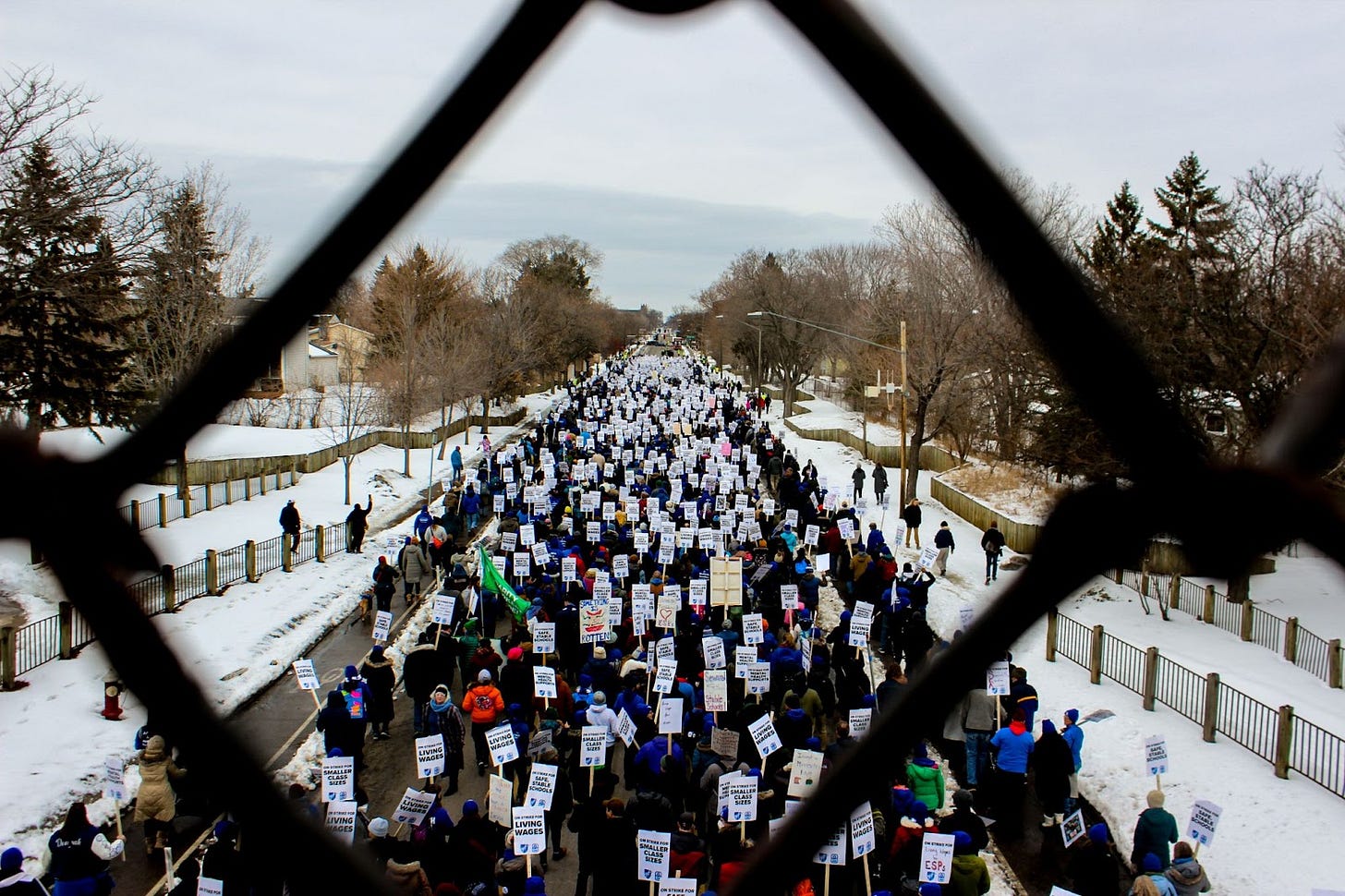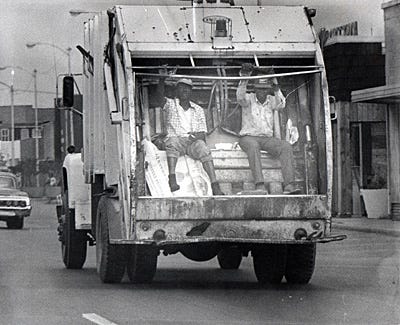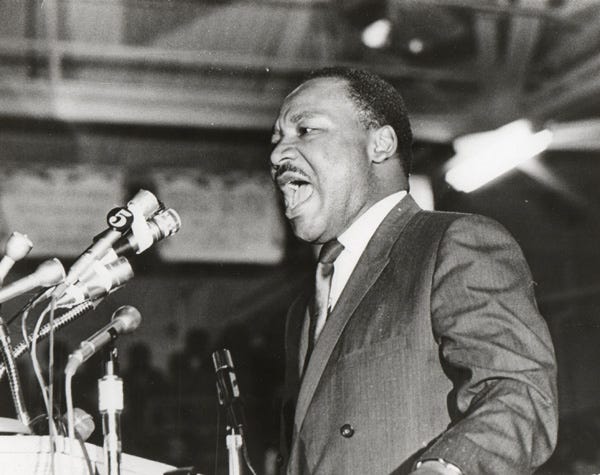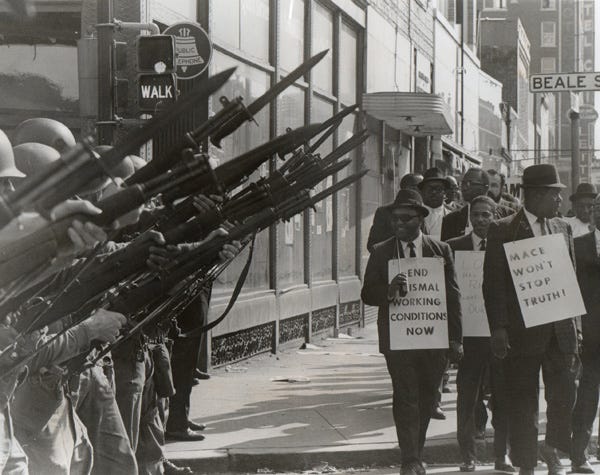What is “feminized” labor?
A few new stories for you on labor and lies.
Happy New Year, friends! If you have a few extra minutes in your day, we’d appreciate it if you could fill out this survey. Thank you to those who have filled it out! ❤️
Our latest story is a review of two of the biggest labor actions last year. The reflections of Marcia Howard with Minneapolis of Federation of Teachers, Local 59 and Kelley Anaas with Minnesota Nurses Association show how gender shows up in their work and organizing, not just in their compensation and working conditions, but also in cultural values and self-awareness. The perspectives and experiences of working people in the Midwest, during a deadly pandemic and also through corporatization, political attacks, and the George Floyd uprisings, are part of a bigger story of how leaders continue to fail our most vulnerable communities and how workers resist and rise up through solidarity.
Read: What Nurses and Teachers Won by Withholding Their “Feminized” Labor
One moment, no one wants to work. The next? Unemployment isn’t high enough.
Workday Magazine editor Sarah Lazare dug into The Lie at the Heart of Politicians' "Job Creation" Rhetoric. She diligently unpacked the narratives that joblessness will curb “inflation” and that all jobs are absolutely good.
We could be creating jobs to make the world a more just, more democratic, and more dignified place for everyone. We could be creating green jobs to repair and prepare for past, present, and future extreme weather events; or hiring more nurses and teachers at underfunded public schools; or expanding our public health infrastructure to treat COVID-19 and prepare for future pandemics.
But for the most part, that kind of job creation doesn’t happen in the United States. Instead, we get job creation to keep building prisons, even amid growing concern about the racism and cruelty these institutions inflict; to continue extracting fossil fuels, even as scientists warn of catastrophic, existential consequences; or to keep manufacturing weapons used to inflict mass atrocities in countries like Yemen.
What do you think?
✨ New year, new labor news
In December, Workday Magazine’s Isabela Escalona reported on home care workers, who reached a tentative agreement with the state of Minnesota, winning a 31% raise. It will have to be approved by the workers and state legislature. The Caregiver Stabilization Act was also introduced this week, which was brought forward to address the crisis in caregiving.
Snow plow drivers in St. Louis county up in northern Minnesota reached a tentative agreement, avoiding a strike they authorized in December.
Minneapolis city council members are planning to propose new labor protections for Uber and Lyft drivers, and DFL state legislators may do the same, according to reporting by Max Nesterak with the Minnesota Reformer.
Workers at Trader Joe’s in Minneapolis, who are still waiting on a contract after voting for a union, walked out on December 31.
Actor, producer, screenwriter, and activist John Cusack agrees with Sarah and Amy that we must face the reality of an oversized military budget when compared to the NLRB budget.
Jay Boller from Racket wrote a piece analyzing an interesting trend: What happens when progressive companies meet unionizing workers? Who could’ve known that companies pretending to care would attract workers who care?
🔥 Learn about Minnesota workers making history
Labor historian and Macalester history professor emeritus Peter Rachleff is preparing to teach a community course on labor history! Check it out and sign up here.
🪧 Remembering MLK’s solidarity with sanitation workers, call for general strike
In 1968, civil rights leader Martin Luther King Jr. was assassinated after supporting 1,300 workers in the Memphis Sanitation Strike, before he was about to lead a second march. Here’s some photos I found in an APM Reports feature about his last march from the Mississippi Valley Collection.
Workers sheltered from rain in the back of the garbage trucks. On February 1, Echol Cole and Robert Walker were crushed to death when their truck malfunctioned. The strike began 11 days later on February 12.
Martin Luther King Jr. speaking at Mason Temple in Memphis in March, encouraging the workers to "escalate" their protest into a general work stoppage.
According to APM Reports, after King’s assassination, residents and journalists came together to collect anecdotes and rectify biased coverage of the strike.
To learn more about the workers behind the strike and how they helped move civil rights and the labor movement forward, check out the documentary, At the River I Stand.
All labor has dignity. We are each other’s harvest.
Thank you for reading. If you enjoyed this newsletter, please share!











